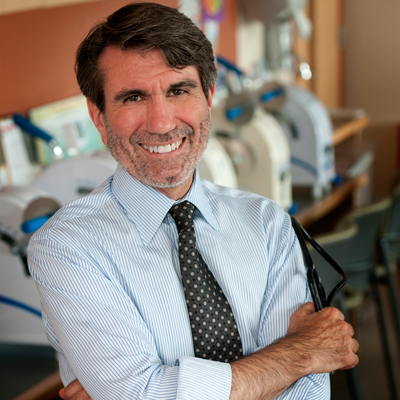
Dr. Kenneth Chapman, Director of the Asthma and Airways Clinic at Toronto Western Hospital hopes a new study, published in the Lancet, will help increase awareness and access to augmentation therapy. (Photo: UHN)
When Ken Bee noticed that he was starting to feel out of breath more easily he thought it was because he hadn't been going to the gym enough.
Being in his mid-50's Ken decided to kick-up his exercise routine to get back in shape, but after a year there was no noticeable improvement.
"I was checked out by my doctor and received a heart test and stress test, but nothing turned up," says Ken. "The next step was to see a respirologist and with my symptoms and a blood test, it was confirmed that I had a genetically caused type of emphysema called Alpha 1 antitrypsin deficiency."
Alpha 1 antitrypsin deficiency is an inherited disorder that can cause emphysema even without exposure to tobacco smoke. Alpha-1 antitrypsin (AAT) is a protein made in the liver that protects the lungs. With this disorder, the AAT protein builds up in liver cells and doesn't reach the lungs to protect them.
Augmentation therapy involves regular infusions of purified AAT protein to raise the level of the protein in the blood and lungs. Although the therapy has been available for more than 25 years, it has seen limited use because doctors have been unsure that it works.
A new landmark clinical study in the Lancet provides convincing evidence that this frequently overlooked therapy for genetically-caused emphysema is effective and slows the progression of lung disease.
"This study will change how clinicians understand this treatment and encourage them to consider its early use before the condition causes severe emphysema," says Dr. Kenneth Chapman, Director of the Asthma and Airways Centre at Toronto Western Hospital and the Canadian research lead for the multicentre trial.
"We can now say with certainty that augmentation therapy is effective and should be given to patients with emphysema caused by this deficiency."
According to the Canadian Medical Association Journal, up to five per cent of people with chronic obstructive pulmonary disease (COPD) are thought to have alpha-1 antitrypsin deficiency, yet only four to five per cent of those with a deficiency have been identified.
Even when the deficiency is diagnosed, there has typically been a delay of five to 10 years before this specific genetic problem has been identified as the cause of respiratory problems.
Luckily for Ken, his respirologist was familiar with the benefits of augmentation therapy, so he learned about it right away. But he quickly found out that the treatment had recently been taken off the provincial funded Ontario Drug Benefit Program and the only other option was to go through private health insurance, which unfortunately his did not cover.
"It was discouraging, but I couldn't just give up – without treatment, this condition only gets worse," says Ken. "So I took to the internet and found a clinical trial at Toronto Western Hospital."
Although Ken was part of the double blind RAPID trial (in which researchers and participants didn't know who was receiving active treatment and who was receiving placebo), he learned after the study was completed that he did indeed receive the augmentation therapy.
He is still receiving the treatment as he is now able to access it through his wife's health coverage. He happily reports that since receiving augmentation therapy his lung function has not decreased. Ken continues to excise and stay active with the use of supplementary oxygen.
"Augmentation therapy not only preserves lung structure, but likely adds years of life," says Dr. Chapman. "Patients with this condition need access to timely diagnosis and treatments to ensure they receive the best possible care".
Dr. Chapman added that this treatment is used only for this specific type of emphysema and is not of benefit to those with more common types of emphysema, chronic bronchitis or COPD.
Patients, like Ken, who have been diagnosed with this condition, welcome the news that there is solid evidence that augmentation therapy is an effective treatment.
"My hope is that more people will recognize the benefit it has to patients."
